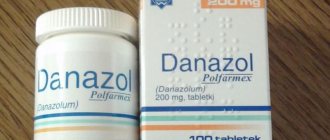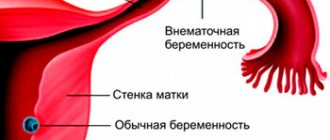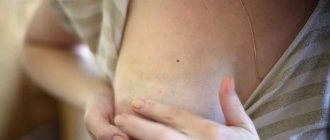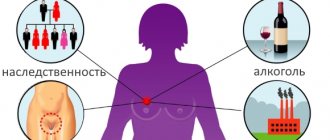Today, almost every woman has had to deal with chest pain, as well as enlarged mammary glands. Perhaps the fair half of the population most often turns to gynecologists with such problems. If your breasts hurt or are enlarged, this does not necessarily mean that the woman is susceptible to a serious illness.
In some situations, chest pain and enlargement of the mammary glands are absolutely natural processes, because the condition of the female breast directly depends on the direction and development of its hormonal levels. It is for this reason that chest pain can be divided into physiological and pathological.
In order to understand what is within the norm and what you need to be wary of, let’s take a closer look at each of the options.
Physiological reasons
There are few reasons:
- puberty in girls;
- menstruation;
- pregnancy;
- recent birth;
- recent abortion.
Are you 11-13 years old, do your nipples become hard, their sensitivity increases, and your breasts become enlarged and painful? You are growing up. Your mammary tissues are forming into luscious breasts.
Do you feel like crying or are you irritated? Would you like to eat chocolates? Have you noticed a slight cyclical increase in breast size, does it hurt a little, or increased nipple sensitivity? Take a look at your calendar, you'll probably get your period soon.
If your period is late, your glands become engorged, your nipples hurt, you have flatulence, and your lower abdomen hurts, you may be pregnant. Just do the test. If you are pregnant, your nipples are irritated by your bra, and your breasts have not enlarged, this is not a reason to panic. Such changes are individual. Of course, if the tests and ultrasound are normal.
You recently gave birth and are breastfeeding your baby. Periodically, several times a day, your glands swell and a sharp pain appears, especially after you drink hot tea. Well, you are familiar with the “flushes” of milk.
If you became pregnant and recently had an abortion, do not be surprised that your breasts are engorged and your nipples hurt. After conception, hormones began to be produced quickly and actively, preparing the body for bearing and giving birth to a child. The process will subside, but you may experience some discomfort for a few days.
In all cases, the discomfort is explained by normal hormonal fluctuations in the female body; no correction is required.
Sometimes the breasts may ache in women who have actively started air travel. At the same time, she may grow a little and even weak transparent discharge from the nipple appears. In this case, you “raided” prolactin. Just in case, consult a gynecologist.
Causes of breast enlargement
- Natural causes of gland enlargement in mature women directly depend on the menstrual cycle. During pregnancy and breastfeeding, the body undergoes serious changes at the hormonal level. This entails changes in the tissues of the mammary glands, their size increases.
- In girls, breasts increase throughout puberty.
- If the growth of the mammary gland is not associated with maturation, then it is most likely provoked by various pathologies. The cause may be uncontrolled growth of connective or fatty tissue in people who are overweight.
- Temporary enlargement of the glands may occur during recovery from a serious illness accompanied by severe weight loss.
Discomfort during breastfeeding
Swollen chest and abdomen: what to do? Changes in the mammary glands are the first sign of pregnancy. The breasts noticeably increase in size, the nipples acquire a brighter, even darker shade, and become incredibly sensitive. The intensity of pain can vary; in some cases, the pain does not leave the woman until labor.
The pain may not stop after childbirth. The breasts swell as a result of lactation, and discomfort is primarily caused by improper organization of feeding the child. Pumping after each feeding and incorrect placement of the baby to the breast can lead to stagnation of milk and cause mastitis. This is why it is so important to listen to all the recommendations of the supervising doctor.
The mammary gland enlarges and hurts during pregnancy in women. These symptoms are especially pronounced in the first three months of the term. Why is this happening? It is during this time period that women produce a large amount of the hormone progesterone, which in turn has a strong effect on the mammary glands.
By producing prolactin and oxytocin, women produce milk, which she can use to feed her baby.
The causes of pain, which are due to menstruation and pregnancy, are physiological. They do not pose a danger to women's health, and therefore do not require drug treatment.
Breast enlargement in a child
If the glands are enlarged in a newborn child and there are no other negative manifestations, then this is not a sign of pathology. This phenomenon is often observed in both female and male babies. Pediatricians call it a newborn hormonal crisis. The main reason is the penetration of mother's hormones into the child's body.
From the swollen
Breasts in newborns may also produce colostrum. This occurs due to increased levels of pituitary hormones. All these signs disappear on their own after about a month. In rare cases, the phenomenon can be observed for a longer time: from 3 months to six months and even up to 10 months.
Breast enlargement in girls, associated with physiological reasons, occurs at the age of 8–11 years. If the mammary glands begin to grow earlier, this indicates the presence of pathology. Early puberty occurs for the following reasons:
- imbalance of gonadotropic hormones;
- mutation of genes responsible for the production of estrogen;
- the presence of a tumor or ovarian cyst;
- hypothyroidism;
- taking hormones;
- tumors caused by chromosomal mutations.
At the same time, the girl’s physical development is normal, but in terms of maturation of the skeletal system, she is a couple of years ahead of her peers.
Boys may also develop breast enlargement between the ages of 11 and 15. This phenomenon is called pubertal gynecomastia. The main manifestations of the deviation are swelling of the areolas and severe sensitivity of the nipples.
gynecomastia in adolescents
normal and hypertrophied breasts
The exact cause of gynecomastia in boys has not yet been identified, but it is believed that it is associated with a temporary imbalance of hormones during puberty. After the body is fully formed, the pathology usually disappears.
Menstrual syndrome
The causes of pain and enlargement of the mammary glands in women are associated with the amount in which one or another type of hormone is released in a certain period of time. So, before women begin menstruation, the breasts may increase in volume and become slightly sore. At the end of this period, unpleasant symptoms disappear on their own. If no alarming manifestations arise, then such a manifestation can be considered normal!
In women, such manifestations of chest pain are called mastodynia. The causes of pain with mastodynia are sometimes quite difficult to distinguish from mastopathy.
The main distinguishing feature of mastodynia is its frequency. That is, the chest does not always hurt. And as soon as menstrual syndrome sets in, all discomfort in women stops. If mastopathy develops, the chest hurts for a long period of time. Unpleasant sensations may continue even after menstrual bleeding has ended.
Infections
It is natural that an infection nestled in the chest will cause pain. Doctors usually talk about the two most common reasons.
Mastitis
It happens when milk “stagnates” and the milk ducts literally become blocked. Symptoms are unpleasant and serious:
- Heat
- Chills
- Warm or swollen breasts
- Nausea
- Weakness
- Vomit
- Yellow discharge from nipples
Mastitis is treated with antibiotics, and discomfort is treated with warm compresses. You can feed and take medications at the same time, but after consulting a doctor about the safety of the drug.
Thrush (aka candidiasis)
In this case, the symptoms look different:
- Nipple pain
- Nipples that are cracked, dry or shiny, itchy, and too pink
- Aching chest pain
- White spots on your baby's cheeks, tongue and gums
After feeding, you may feel a sharp piercing pain in your chest.
Thrush, of course, needs to be treated with medication, not only for yourself, but also for the baby. For specific recommendations, you should consult your doctor.
To prevent thrush from returning, try these steps:
- Replacement and washing of linen every day, and at high temperature with the addition of bleach
- Using only disposable diapers
- Washing the nipples after feeding with water and a small amount of vinegar.
Breast fibroadenoma
Fibroadenoma is a benign formation in the mammary gland. They can cause a feeling of heaviness. Cysts form when gland tissue thickens and can cause pain or discharge from the nipples.
Treatment
The following methods can be used to relieve symptoms for fibroadenoma:
- Warm or cold compresses (depend on how you feel)
- Changing your bra to a more comfortable one
- Avoiding salt, caffeine and fatty foods
- Taking oral contraceptives
- Taking painkillers
If a cyst is causing you concern or discomfort, your doctor may drain it.
Pregnancy
Excessive sensitivity, a feeling of “fullness” and heaviness during pregnancy are normal, and symptoms may appear in the first trimester.
Progesterone increases the sensitivity of the breasts, and this cannot be avoided - it is this hormone that maintains pregnancy. Additionally, progesterone "straightens up" in the second half of your menstrual cycle.
Breasts grow as your pregnancy progresses, and this may be accompanied by pain from underwear that is too tight or from a change in the load on your shoulders and back. The beginning of lactation is also associated with unusual, not always pleasant and even painful sensations.
Treatment
The main treatment method in this case is the correct underwear. Maternity bras are designed to distribute weight correctly, relieving painful weight imbalances. Also, according to a 2020 study, cold and hot compresses are quite effective. They need to be applied to the painful area for twenty minutes, alternating temperatures and repeating this procedure twice a day.
Typically, breast pain during pregnancy is not too severe and does not require medication. But if the pain is more intense than just an “unpleasant pulling”, do not put off going to the doctor.











